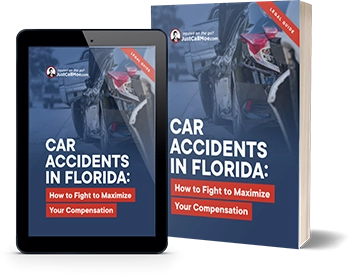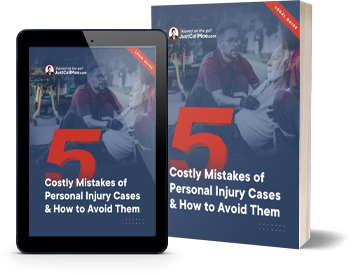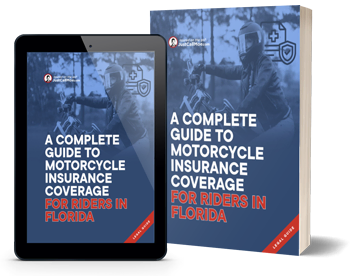In many car accidents, more than one party shares the blame. Fault is a primary component in car accident claims and is more important than you may realize.
You’ve probably heard that admitting fault in a car accident case is bad, but do you know why? Fault indicates who is responsible for causing the collision and determines who is liable for paying damages. Our experienced Winter Haven car accident lawyers explain.
Why Is Admitting Fault in a Car Accident a Bad Idea?
If you admit fault to anyone, insurance companies often use that statement against you to reduce how much compensation they must pay. Although negligence laws vary state by state, your assigned degree of fault determines whether you can seek compensation and the maximum amount you are eligible to obtain.
In some states, drivers who are at fault to any degree cannot seek compensation from other at-fault parties. However, you can ask for compensation even if you are 99% responsible.
Florida uses modified comparative negligence. Under this statute, you can seek compensation from other at-fault parties if your assigned degree of fault isn’t over 50%. However, there’s a catch.
Your percentage of fault also reduces your payout. If you are 25% responsible for causing your accident, or 25% at fault, the most compensation you can receive is 75% of your total economic damages.
Should You Admit Fault in a Car Accident To Be Polite?
Even if you believe you bear some responsibility, do not apologize. Insurance companies and the court may consider a simple “I’m sorry” as admitting fault in a car accident and use it to reduce your compensation.
If you made a similar statement, don’t worry. Contact JustCallMoe as soon as possible so we can help ensure that your assigned degree of fault is accurate and not based on a spur-of-the-moment apology.
Does Fault Refer to Florida’s No-Fault Insurance?
Don’t confuse fault in a car accident with no-fault insurance. Although they both apply to car accidents, they are different.
Florida drivers must purchase personal injury protection (PIP) insurance policies along with other types of auto insurance coverage. PIP policies, sometimes called no-fault insurance, pay some of your accident-related expenses up to your policy limit, regardless of who is at fault for causing the crash.
PIP insurance lets you get the medical treatments you need immediately without worrying about payment. Many times, your PIP limits won’t cover all of your expenses. These policies also don’t cover non-economic damages, such as pain and suffering.
If you qualify, you can seek further compensation from at-fault parties. That’s where admitting fault in a car accident or determining fault comes into play. Contact JustCallMoe and request a free case evaluation. We can tell you the types of damages you are eligible to receive.
Who Decides Fault in a Car Accident?
Law enforcement responding to a car accident can document their opinion about who caused the crash, but other factors determine fault. Most collisions happen due to human error, and many of those errors are the result of negligence.
In legal matters, negligence means failing to act as a reasonable person would in the same situation. Drivers must drive safely to reduce the likelihood of harming others. To prove that another driver was negligent, you need evidence to show:
- Someone owed you a duty of care
- That party breached their duty of care
- You sustained injuries
- Your injuries and related damages are a direct result of the breach
If you can prove negligence, it helps to place fault on the negligent driver.
When you hire a car accident attorney from JustCallMoe, we will investigate your accident and locate evidence by obtaining copies of police reports and your medical records, interviewing eyewitnesses, and viewing photos of the accident scene. One party initially admitting fault in a car accident — even if they later deny it, a vehicle’s placement after the collision, and its damage also provide clues as to how the accident happened.
Insurance companies often try to place an undeserved degree of blame on drivers to reduce payouts or make them ineligible to file a compensation claim. One of your attorney’s most important jobs is ensuring any fault placed on you is fair.
What Kinds of Negligence Can Lead to a Car Accident?
Although you should never admit fault in a car accident, the blame is sometimes obvious. Common examples of negligent driving include:
- Distracted driving
- Speeding, aggressive, or reckless driving
- Driving under the influence of alcohol, drugs, or fatigue
- Following too closely, unsafe lane changes, or failing to yield the right of way
- Failing to follow traffic laws
These behaviors may not be fully responsible for an accident, but they are unsafe and considered negligent.
What Kinds of Damages Are Available in Florida Car Accidents?
Case-specific factors, like admitting fault in a car accident, will determine what, if any, kind of compensation you are eligible to seek and how much you may receive. Your attorney from JustCallMoe can tell you how much your case is worth.
In general, those injured in car accidents can seek economic damages for medical expenses, lost wages, replacement services, and property damage. You may also qualify for future medical expenses and lost wages.
Non-economic damages compensate for such things as pain and suffering, anxiety, losing the ability to enjoy life, and other negative impacts on your quality of life. Insurance companies usually won’t offer this compensation and may fight your claim.
In rare cases, you may receive punitive damages to punish the at-fault party for particularly reprehensible behavior.
Need a Lawyer for Your Car Accident Case? Call Us
Avoiding admitting fault in a car accident is just the first step in your car accident case. Contact JustCallMoe to request your free case evaluation. Our award-winning personal injury law firm has the experience and resources to fight for the compensation you need for your injuries and damages. You don’t pay unless we win compensation for you. Don’t delay. Call JustCallMoe today.

 (866) 225-5663
(866) 225-5663




 100% Secure and Confidential
100% Secure and Confidential